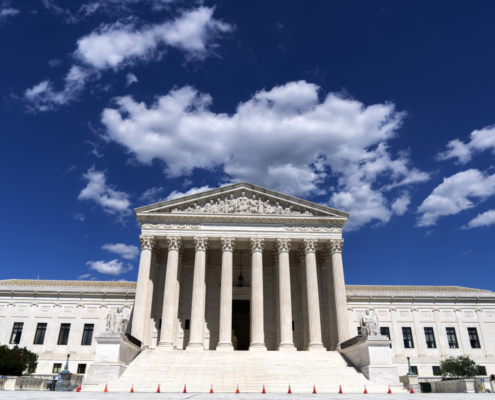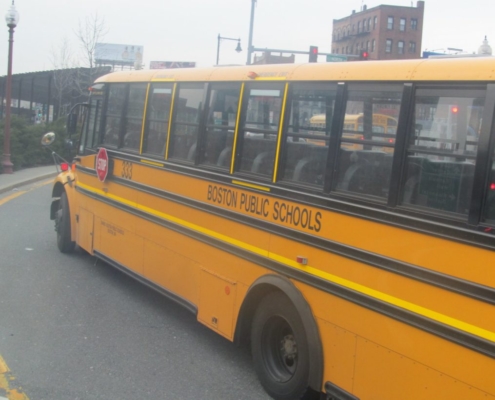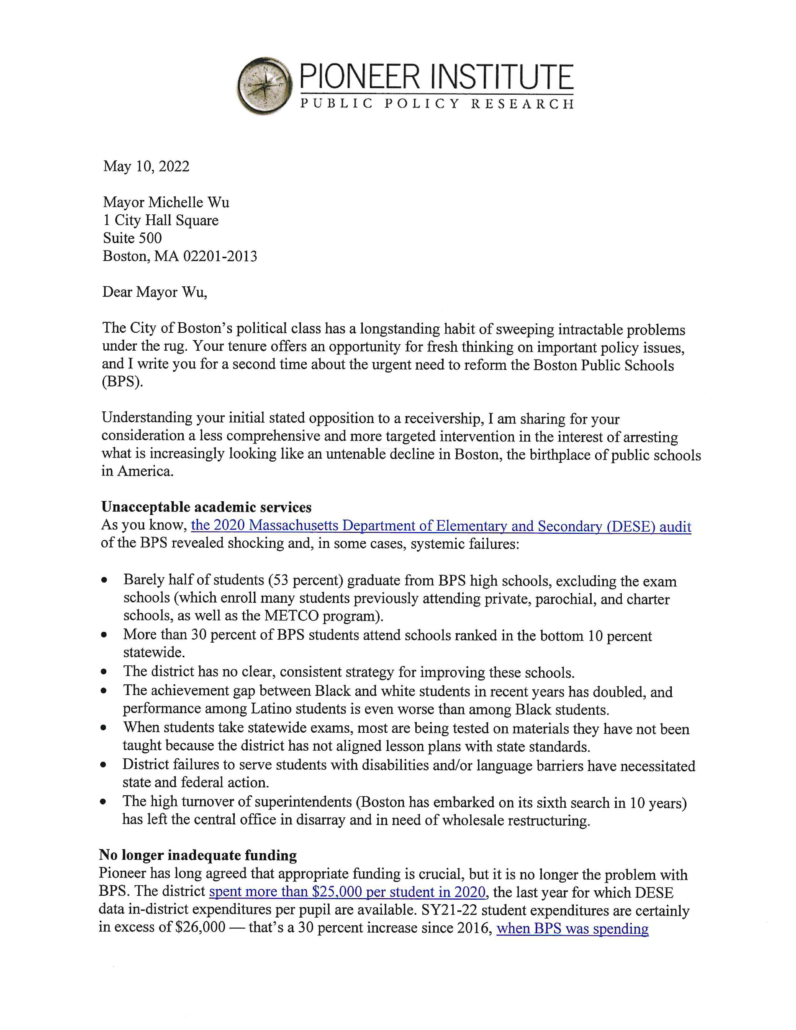Open Letter to Mayor Michelle Wu on the Boston Public Schools
/in Academic Standards, Featured, News, Related Education Blogs /by Editorial Staff Share on Facebook
Share on Twitter
Share on
LinkedIn
+
“Barely half of students (53 percent) graduate from BPS high schools, excluding the exam schools,” Pioneer Institute Executive Director Jim Stergios underscores at the start of this Open Letter to Boston Mayor Michelle Wu.
That’s just one in a long litany of troubles within the Boston Public Schools, much of which is due to chaotic management and at times even willful misleading of the public.
In this letter, Pioneer recommends fresh thinking, and, specifically, a highly focused and time-limited intervention, in partnership with the state department of education.
Get Updates on Our Education Research
Related Content:

RespectAbility’s Jennifer Laszlo Mizrahi on Empowering People with Disabilities
This week on “The Learning Curve," co-hosts Gerard Robinson and Cara Candal talk with Jennifer Laszlo Mizrahi, President of RespectAbility, a nonprofit organization advancing opportunities so 57 million Americans with a disability can fully participate in all aspects of community. She shares her personal story struggling with dyslexia and ADHD, and what drew her to this cause. She reviews the various kinds of disabilities that people live with, and the strides our society is making to integrate and accommodate disabled citizens into everyday life.

Lipan Apache Tribe’s Pastor Robert Soto on Native American Heritage Month & Religious Liberty
This week on “The Learning Curve," co-hosts Gerard Robinson and Cara Candal talk with Pastor Robert Soto, a Lipan Apache religious leader and award-winning feather dancer who has successfully upheld his Native American cultural heritage and religious liberties in federal courts. As the country celebrates Native American Heritage Month, Pastor Soto shares his personal journey as a religious leader and describes the Lipan Apache Tribe.

Chan Zuckerberg Initiative’s Dr. Bror Saxberg on Learning Science & School Reform
This week on “The Learning Curve,” co-hosts Gerard Robinson and Cara Candal talk with Dr. Bror Saxberg, MD, Vice President of Learning Science at the Chan Zuckerberg Initiative. Dr. Saxberg describes his groundbreaking work in the area of learning science and understanding how “working memory” and “long-term memory” can help improve academic excellence and equity.

Award-Winner Prof. David Reynolds on Abraham Lincoln & American Civil War Culture
This week on “The Learning Curve," co-hosts Gerard Robinson and Cara Candal talk with David Reynolds, a Distinguished Professor of English and History at the Graduate Center of the City University of New York. He is the author of Abe: Abraham Lincoln in His Times, selected as one of the Top Ten Books of the Year by The Wall Street Journal and The Washington Post. Professor Reynolds shares what teachers and students alike should know about the culture of Civil War America, primary education in that era, and the wide variety of influences on Lincoln’s thinking and leadership.

CRPE’s Robin Lake on COVID School Closures & Learning Loss
This week on “The Learning Curve," co-hosts Gerard Robinson and Cara Candal talk with Robin Lake, director of the Center on Reinventing Public Education (CRPE), a non-partisan research and policy analysis organization developing transformative, evidence-based solutions for K-12 public education.

Maine Tries to Ignore a Clear Supreme Court Ruling on Education
As the U.S. Supreme Court takes up Carson v. Makin, the facts are clear. Maine has chosen to subsidize private education. As such, it cannot disqualify all religious schools from receiving public dollars under its school choice program.

Prof. Raymond Arsenault on the 60th Anniversary of the Freedom Rides & Civil Rights
This week on “The Learning Curve," co-hosts Gerard Robinson and Cara Candal talk with Raymond Arsenault, the John Hope Franklin Professor of Southern History at the University of South Florida, and author of several acclaimed and prize-winning books on civil rights, including Freedom Riders: 1961 and the Struggle for Racial Justice. He shares how he became interested in researching, writing, and teaching about the Civil Rights Movement.

Time for State Action on Troubled Boston Schools
Given the failures of both appointed and elected school boards, perhaps the time has come to have the state Department of Elementary and Secondary Education appoint the members of the Boston School Committee. Patience might be warranted if the Boston Public Schools were improving. But we have waited for decades, and they are only getting worse. Holding adults in the system accountable was a cornerstone of the Education Reform Act. If not now, when?




